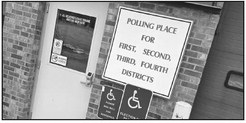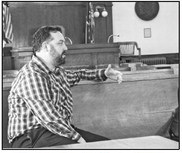No wheel tax on buggies, please
by Peter Weinschenk, Record-Review
Today’s challenge in transportation policy is to figure out how to pay for roads when vehicle technology on highways, streets and rural lanes continues to evolve. For years, the state levied a gas tax, but, with the advent of high mileage cars and electric vehicles, that source of revenue has faltered, failing to keep up with the ever-increasing cost of road maintenance.
Since 2011, the state legislature has convened three major tax forces to research the future of highway funding. In the current state budget, the legislature inserted $2.5 million to investigate a vehicle-miles-travelled tax option.
Given this future focus, we are surprised, then, by a bill recently proposed by Assembly Transportation Committee chairman Rep. Bob Kulp (R-Stratford) and 11 other legislators.
It would give counties the ability to impose up to a $100 wheel tax on Amishstyle animal drawn buggies.
We would have thought that Wisconsin would have figured out how to pay for horse-drawn carts two centuries ago, but, apparently, this is still a live issue.
What accounts for this new interest in charging Wisconsin’s plain-clothed residents for use of horses and buggies? Possibly, the legislators have heard complaints that steel-wheeled buggies with horses that have cleats in their hooves may be damaging the public highways. More likely, they have heard from citizens who pay county or municipal wheel taxes on their trucks and cars and wonder why their Amish or Mennonite neighbors don’t have to pay a similar vehicle registration fee on their buggies.
Frankly, we don’t see this legislation moving Wisconsin towards a sustainable transportation policy of the future.
Instead, it dabbles in the absurd. It seems to insist that any set of wheels on a public road, by some rule of fairness, needs to pay a wheel tax. We then wonder what the legislators will think of next? Possibly vehicle registration fees on bicycles? Or skateboards? Or roller skates? We would rather the legislature keep up with the times and tax vehicles that actually damage the public roads, especially out here in rural Wisconsin.
For decades, the state has permitted farmers and others involved in agriculture to buy non-taxed fuel for tractors on the theory that this machinery stayed on the home farm’s 80 acres.
But that’s no longer the case. In today’s world of agriculture, farmers have land all over the place. They commonly drive tractors and implements on public roads from one field to the next. These are no Amish buggies. Instead, these are heavy machines capable of damaging roads. They do so at a cost that town boards in farm country can’t afford, especially given what the state continues to pay in highway aids.
A forward-thinking legislature should demand that red-dyed or untaxed fuel not be used by any tractor that travels the public road.
The legislature, while they are at it, should also make sure that commercial manure haulers not be able to transport loads on the public highways with untaxed fuel. These haulers have an important job to do, but, in hauling liquid manure in large tankers, they can wreck gravel town roads. These business people should help pay for the damage they cause.
We think Rep. Kulp’s bill proposes the wrong future for public highway funding.
What he would do is charge a fee on vehicles, being careful to make sure that all vehicles will be appropriately charged. This approach is fair, but only superficially so. Real fairness requires taxing vehicles based on the damage done to the public highway. The idea is that you pay for roads based on use.
Our advice would be for the state legislature to just let the Amish and Mennonites do their thing and not, like Indiana and Illinois, register and tax their buggies.
Our legislators should worry about the cars and trucks of the future, not animal drawn vehicles from the past.




